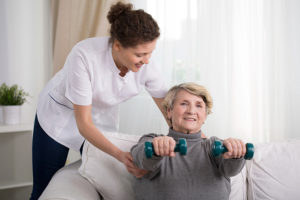Stroke Recovery
Everything You Need to Know about After-Stroke Care

Action needs to be swift to encourage optimal stroke recovery. To that end, we’ve created a comprehensive stroke care plan for seniors and their loved ones.
This plan will detail what can be done to reduce the risk of a stroke, as well as what can be done afterward to ensure the senior lives a happy, healthy, fulfilling life.
Is It Possible to Prevent Strokes from Happening in the First Place?
In Canada, there are more than 50,000 strokes a year.
And it is one of the leading causes of death in adults in Canada.
According to MediReources Inc, on average, one stroke occurs every 10 minutes; 15% of them will result in death, 10% will result in complete recovery, and the remaining in varying degrees of long-term disability.
Unfortunately, the older we get, the more dangerous these events can be. They can cause serious, debilitating, long-term disabilities and even death.
A stroke is caused by a blocked artery, a leaking blood vessel, or a burst blood vessel. The blood supply to the brain is then disrupted, and brain cells begin to die.
Some common risk factors include:
High blood pressure
Smoking
Diabetes
Obesity
Inactivity
High cholesterol
Atrial fibrillation
Family history
Prior strokes or TIAs
Heart attack
Thankfully, there are a few preventative methods you can take to reduce the risk of having a stroke.
- Quit smoking: Between 5 to 15 years after quitting smoking, your risk of getting a stroke is similar to a person who has never smoked
- Work with your physician to reduce your blood pressure and cholesterol to a healthy level
- Keep to a healthy weight through regular exercising and nutritious diet
- Control your stress level through meditation, yoga and other methods
What Seniors Can Expect after Experiencing a Stroke
Once a person has had a stroke, the next step they should take is focusing on stroke recovery.
After a stroke, a patient may have difficulty speaking, walking and swallowing. In some cases, everyday tasks can also become difficult, like getting themselves dressed.
They may also experience vision difficulties, depression, difficulty concentrating, mood swings, and anxiety.
When a stroke patient goes home, they’ll require a lot of after-stroke care. The patient’s family or caregivers should implement a stroke care plan immediately.
The care plan should be catered to the stroke patient’s specific needs. Some common care may include:
Personal Care such as assistance with using the toilet, dressing, bathing, and grooming
Meal planning and preparation
Medication assistance and management
Fall prevention
Housekeeping
A patient will also require to be taken to a variety of specialists for therapy including:
Occupational and/or physical therapist
Clinical psychologist
Ophthalmologist
Speech therapist
Medical appointment
Stroke Recovery Guide
Creating a Stroke Care Plan for Seniors
At All About Seniors, our caregivers have years of experience and we have created an extensive stroke patient care plan. We want to encourage healthy stroke recovery with all of our patients.
Our plan includes:
- Personal care (assisting with going to the bathroom, bathing, walking)
- Meal planning, shopping, and food preparation
- Medication management
- Fall prevention
- Housekeeping
- Running errands, taking the patient to healthcare appointments.
This after-stroke care plan can help reduce the risk of injury and improve the quality of life for stroke patients.
How a Caregiver Can Help Make a Senior’s Life Better
Should a caregiver be hired to help a senior after they’ve been through a stroke? Absolutely!
Having a professional caregiver can make life after a stroke easier for both the patient and their family.
Most people do not know how to take care of themselves or their family member after a stroke. This can create a lot of stress and frustration for both parties.
Family members who take on the responsibility of taking care of a stroke patient might face emotional, physical and financial challenges while juggling with their personal lives and work.
Our caregivers offer home care services that a person needs after a stroke.
We can provide care and be a source of comfort to seniors no matter where they are – at home, in a care facility, even in the hospital.
Caregivers can also give seniors the uplifting companionship they need after dealing with a life-threatening ordeal, like a stroke.
Hiring a caregiver is an important part to help the patient recover in their familiar environment.
Would you like more information regarding our senior post-stroke recovery plan? Contact us today to learn more. We’re happy to answer all of your questions.
